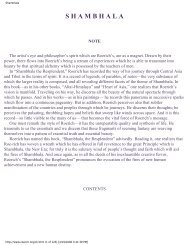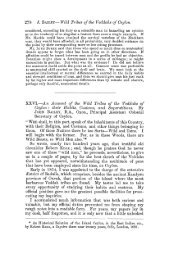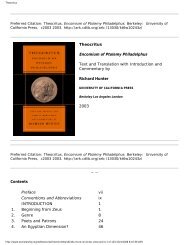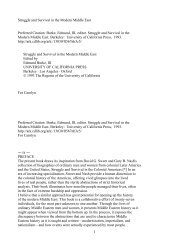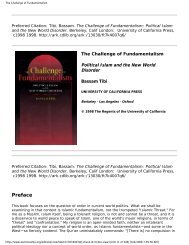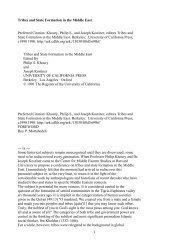Between Two Worlds Kafadar.pdf
Between Two Worlds Kafadar.pdf
Between Two Worlds Kafadar.pdf
Create successful ePaper yourself
Turn your PDF publications into a flip-book with our unique Google optimized e-Paper software.
comparison of Byzantine and Ottoman accounts of Orphan's alliance with<br />
Kantakouzenos, and Lefort and Foss's explorations of the chronicles on the basis<br />
of Bithynian archeology are other examples.[120] The detailed analyses of<br />
Yerasimos, who compares the<br />
― 105 ―<br />
different versions of the Ottoman genealogy and of the legends about Hagia<br />
Sophia, also succeed in shedding significant light on the ideological programs<br />
of different chroniclers.[121]<br />
The Case of Osman and His Uncle<br />
While the Ottoman chronicle tradition should be treated with extreme caution, we<br />
cannot forget that it contains some of the precious few things we have on early<br />
Ottoman history. Rather than dismissing it, we ought to venture boldly into the<br />
wrinkled space of its textual intricacies, compare variants in detail, focus on<br />
choice of stories, words, and even spelling if promising, and try to ascertain<br />
what if anything these may reveal of early Ottoman realities. This is a road<br />
filled with traps and there are bound to be dead ends and wrong paths taken. And<br />
most of what one cay say in the end will remain hypothetical. But isn't giving<br />
up on this task even less rewarding?<br />
Take the fascinating case of Osman's competition with his uncle Dündar, for<br />
instance. It is related by Nesri , but missing in all of the known earlier<br />
chronicles, that after Ertogril's death, some wanted Osman and others Dündar to<br />
be the new beg. Realizing that Osman had strong support, the uncle gave up and<br />
accepted his nephew's chieftainship.[122] The reconciliation seems to have been<br />
superficial because in a later episode we read that Osman, annoyed by the<br />
patronizing attitude of the (Christian) lord of Bilecik, wanted to seize him,<br />
but Dündar argued that they already had enough enemies and could not afford to<br />
make any more. Osman interpreted this response, Nesri writes, as his uncle's<br />
wish to undermine the young man's political bid (literally, his "coming out,"<br />
huruc ). So he shot his uncle down with an arrow and killed him.[123]<br />
Where does Nesri get these pieces of information about Osman and Dündar which<br />
are not to be found in any of the earlier sources known to us? Could he have<br />
made them up? To make the post-Mehmed II practice of fratricide seem more<br />
palatable? This is not impossible, but a much more likely explanation is that<br />
Nesri had access to some early traditions which the chroniclers chose to edit<br />
out of their texts.[124] Besides, why would Nesri , if he were fictionalizing to<br />
legitimize fratricide, not have Osman kill his brother Gündüz, especially in the<br />
episode when the two disagree, just like Osman and Dündar, on the course of<br />
action to be taken vis-à-vis their neighbors? Furthermore, writing slightly<br />
later than Nesri and using his chronicle, Ibn Kemal relates not only Nesri's<br />
version of this story but also another one with the same ending.[125]<br />
― 106 ―<br />
There were dearly "Osman and Dündar" stories that did not make it into the texts<br />
of Apz, Uruç, and the anonymous chroniclers. Whether the stories were true or<br />
94




